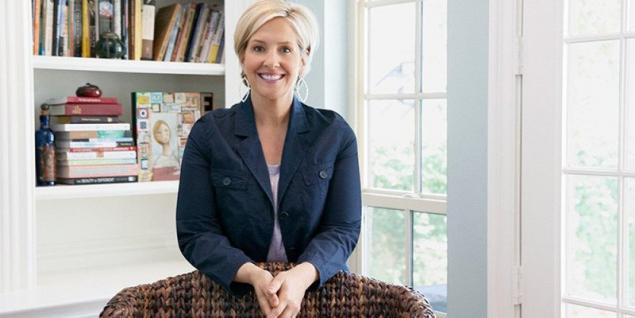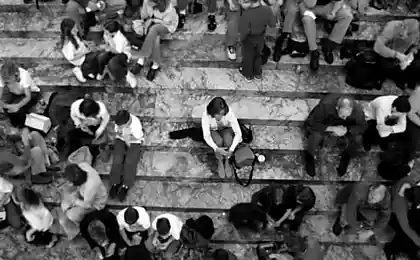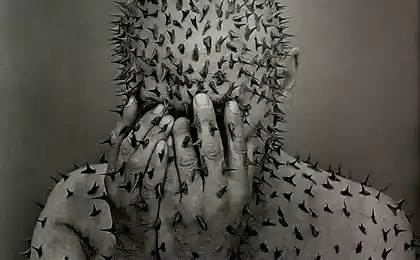763
Brené brown: Own imperfection — the only thing that makes us unique
Shame is epidemic in our culture, says researcher Bren brown, who dedicated the last 5 years research project on the study of interpersonal communication. She found out that the main problem underlying the social interaction,is the vulnerability and the inability to accept their own imperfection — the only thing that makes us unique.

The first ten years of my work I conducted among social workers: earned a degree in social work, talked with social workers, made a career in this field. Once we got a new Professor and said, "Remember: everything that cannot be measured, does not exist." I was very surprised. There we soon got used to the fact that life is chaos. Most people around me just trying to love her like this, and I always wanted to organize is to take all this diversity and put in a beautiful box.
I used to like, knock discomfort upside the head and push him away and get straight a's. And I found my way, decided to look to the most complicated of the topics to understand the code and show others how it works. I chose the relationship between people. Because after spending ten years as a social worker, you begin to realize that we're all here for relationships — they are the purpose and meaning of our lives. The ability to feel affection, a connection between people at the level of neuroscience — that's what we live for. And I decided to investigate the relationship.
You know, sometimes, you come to the boss and he tells you: "That's thirty-seven things you're just better, and here is another thing that you have to grow". And all that remains in your head — this last thing. My work looked about the same. When I asked people about love, they talked about grief. When asked about affection, they talked about the most painful breakups. On the question of location, I received stories about loss. Very quickly, after six weeks of research,I came across an unnamed obstacle that affects all.
When we stopped to figure out what it is, I realized that it was a shame. And shame is easy to understand, shame is fear of loss of relationship. We are all afraid that not good enough for a relationship — not thin, rich, good. This global feeling is not only those people who basically are not able to build a relationship.
The basis of shame lies the vulnerability that arises when we realize that in order for things to take place, we need to reach out and let see ourselves for who we really are.
I hate vulnerability. And I thought it was a great chance to attack her with all your tools. I was going to analyze it to understand how it works and outsmart it. I was going to spend on this year. In the end, it turned into six years and thousands of stories, hundreds of interviews, some people sent me pages of their diaries. I wrote a book about his theory, but something wasn't right. If you divide all the people I interviewed to people who feel a need but in the end it all comes down to that feeling — and those who are continually fighting for this feeling between them was only one difference. It was the fact that those who have a high degree of love and belonging believe they're worthy of love and acceptance. And that's all. Simply believe they are worthy of it. That is what separates us from the love and understanding is the fear of not being loved and understood. Deciding that this is necessary to understand in detail, I began to study this first group of people.
I took a nice folder, neatly filed there files and wondering how to call it. And the first thing that came to my mind was "Sincere."
These were sincere people living with the feeling of being wanted. It turned out that the overall quality was courage (courage). And it's important that I use this word: it comes from the Latin cor, heart. Originally it meant "to talk from the heart about who you are." Simply put, these people had the courage to be imperfect. They lacked mercy for others, because they were merciful to yourself is essential. And they had a relationship because they have the courage to abandon ideas about how they should be, in order to be what they are.The relationship can't happen.

These people had something else in common. Vulnerability. They believed that what makes them vulnerable, makes them beautiful, and accepted it. They, unlike people in the other half of the study, not talking about vulnerability as something that makes them feel comfortable or, on the contrary, causes great inconvenience — they talked about the need for it. They talked about the fact that you need to be able to say "I love you" that you need to be able to act when there are no guarantees of success, on how to sit quietly and wait for the call the doctor after a serious examination. They were willing to invest in relationships that may not emerge, moreover, considered it a necessary condition. It turned out that vulnerability is not weakness. It is emotional risk, exposure, unpredictability, and she fills our life with energy every day. Investigating this topic for over ten years, I came to the conclusion that vulnerability, the ability to show himself to be weak and to be honest it's the most accurate tool for measuring our courage.
I took it as a betrayal, it seemed to me that my research took advantage of me. After all, the essence of the process of this research is to control and predict, to study the phenomenon for clear goals. And here I come to the conclusion that the conclusion of my research says that you need to accept vulnerability and to stop controlling and predicting. Here I had a crisis.My therapist is, of course, called a spiritual awakening, but I assure you — it was a real crisis.
I found a therapist — it was such a therapist, to whom I go other psychotherapists, sometimes we need to do it to check the readings. I brought to the first meeting, a folder with the study of happy people. I said, "I Have a problem with vulnerability. I know that vulnerability is the source of our fears and complexes, but it turns out that it also produces love, joy, creativity and understanding. I need something to deal with it". And she nodded and told me: "This is not good and not bad. It just is what it is". And I went to deal with it. You know, there are people who can accept the vulnerability and tenderness and continue to live with them. I'm not. I with such people and communicate something difficult, so for me it was a street fight length in another year. In the end I lost the battle with vulnerability, but might have regained your own life.
I returned to study and began to see what decisions are made these happy genuine people, what they do with vulnerability. Why do we need to fight it? I posted on Facebook the question of what makes people feel vulnerable, and in an hour got a hundred and fifty answers. To ask my husband to look after you when you're sick, take the initiative in sex, to fire an employee, hire employee, to date, to hear the diagnosis from the doctor — all of these situations were in the list. We live in a vulnerable world. We cope with it, just constantly suppressing their vulnerability. The problem is that feelings can not be suppressed selectively. You can't choose — here's me, the vulnerability, the fear, the pain, that's all I don't need, I don't want to feel. When we repress all of these feelings, together with them, we numb gratitude, happiness and joy, then nothing can be done. And then we feel miserable and even more vulnerable, and trying to find meaning to life, and go in the bar where they ordered two bottles of beer and cakes.
Here are a few things that, in my opinion, we should think.
The first is that we make uncertain things certain. Religion has gone from sacraments and faith to certainty. "I'm right, you're not. Shut up." So. Unambiguity. The more frightened we are, the more vulnerable we are, and we only even worse. It looks like the current policy. There is no more debate, no discussion, only accusations. The charge is a way to release the pain and discomfort.
Second — we are constantly trying to improve their lives. But it doesn't work — basically, we just pumped the fat from their thighs on the cheeks. And I hope that people in a hundred years will look at this and very surprised.
Third — we desperately shielded their children. Let's talk about how we treat our children. They come into this world programmed to fight. And it is our responsibility to hold them, dress nicely and make sure that their perfect life they played tennis and went to all possible circles. No. We must look them in the eye and say: "You are imperfect. You came here imperfect and designed to a lifetime to struggle with this, but you are worthy of love and care". Show me one generation of children so educated, and I'm sure we will be surprised at how many of the current problems will simply disappear from the face of the earth.
We pretend our actions don't affect other people. We do this in your personal life and at work. When we take the loan, when the deal breaks down, when the sea spilled oil, we pretend that we have nothing to do. But it's not. When these things happen, I want to say to the corporations: "Guys, we are strangers. We are accustomed to much. We just want you to stop pretending and said, "Excuse us. We can fix it".
Shame is epidemic in our culture, and to recover from it and find a way back towards each other, we need to understand how it affects us and what drives us to do. For continuous and unimpeded growth of shame requires three components: secrecy, silence and judgment.
The antidote to shame is empathy. When we suffer, the most powerful people next to us must have the courage to tell us: I also. If we want to find a way to each other, that path vulnerability. And it's much easier to stay away from the arena his whole life thinking you will go when you become bulletproof and the best. The fact that it will never happen. And even if you're as close to the ideal, will still find that when you go into that arena, people don't want to fight with you. They want to look you in the eye and see your sympathy.
Author: brené brown, "the Power of vulnerability"
P. S. And remember, just changing your mind - together we change the world! ©
Source: theoryandpractice.ru/posts/6295-lyudyam-nado-nauchitsya-smelosti-byt-nesovershennymi-bren-braun-o-styde-i-uyazvimosti

The first ten years of my work I conducted among social workers: earned a degree in social work, talked with social workers, made a career in this field. Once we got a new Professor and said, "Remember: everything that cannot be measured, does not exist." I was very surprised. There we soon got used to the fact that life is chaos. Most people around me just trying to love her like this, and I always wanted to organize is to take all this diversity and put in a beautiful box.
I used to like, knock discomfort upside the head and push him away and get straight a's. And I found my way, decided to look to the most complicated of the topics to understand the code and show others how it works. I chose the relationship between people. Because after spending ten years as a social worker, you begin to realize that we're all here for relationships — they are the purpose and meaning of our lives. The ability to feel affection, a connection between people at the level of neuroscience — that's what we live for. And I decided to investigate the relationship.
You know, sometimes, you come to the boss and he tells you: "That's thirty-seven things you're just better, and here is another thing that you have to grow". And all that remains in your head — this last thing. My work looked about the same. When I asked people about love, they talked about grief. When asked about affection, they talked about the most painful breakups. On the question of location, I received stories about loss. Very quickly, after six weeks of research,I came across an unnamed obstacle that affects all.
When we stopped to figure out what it is, I realized that it was a shame. And shame is easy to understand, shame is fear of loss of relationship. We are all afraid that not good enough for a relationship — not thin, rich, good. This global feeling is not only those people who basically are not able to build a relationship.
The basis of shame lies the vulnerability that arises when we realize that in order for things to take place, we need to reach out and let see ourselves for who we really are.
I hate vulnerability. And I thought it was a great chance to attack her with all your tools. I was going to analyze it to understand how it works and outsmart it. I was going to spend on this year. In the end, it turned into six years and thousands of stories, hundreds of interviews, some people sent me pages of their diaries. I wrote a book about his theory, but something wasn't right. If you divide all the people I interviewed to people who feel a need but in the end it all comes down to that feeling — and those who are continually fighting for this feeling between them was only one difference. It was the fact that those who have a high degree of love and belonging believe they're worthy of love and acceptance. And that's all. Simply believe they are worthy of it. That is what separates us from the love and understanding is the fear of not being loved and understood. Deciding that this is necessary to understand in detail, I began to study this first group of people.
I took a nice folder, neatly filed there files and wondering how to call it. And the first thing that came to my mind was "Sincere."
These were sincere people living with the feeling of being wanted. It turned out that the overall quality was courage (courage). And it's important that I use this word: it comes from the Latin cor, heart. Originally it meant "to talk from the heart about who you are." Simply put, these people had the courage to be imperfect. They lacked mercy for others, because they were merciful to yourself is essential. And they had a relationship because they have the courage to abandon ideas about how they should be, in order to be what they are.The relationship can't happen.

These people had something else in common. Vulnerability. They believed that what makes them vulnerable, makes them beautiful, and accepted it. They, unlike people in the other half of the study, not talking about vulnerability as something that makes them feel comfortable or, on the contrary, causes great inconvenience — they talked about the need for it. They talked about the fact that you need to be able to say "I love you" that you need to be able to act when there are no guarantees of success, on how to sit quietly and wait for the call the doctor after a serious examination. They were willing to invest in relationships that may not emerge, moreover, considered it a necessary condition. It turned out that vulnerability is not weakness. It is emotional risk, exposure, unpredictability, and she fills our life with energy every day. Investigating this topic for over ten years, I came to the conclusion that vulnerability, the ability to show himself to be weak and to be honest it's the most accurate tool for measuring our courage.
I took it as a betrayal, it seemed to me that my research took advantage of me. After all, the essence of the process of this research is to control and predict, to study the phenomenon for clear goals. And here I come to the conclusion that the conclusion of my research says that you need to accept vulnerability and to stop controlling and predicting. Here I had a crisis.My therapist is, of course, called a spiritual awakening, but I assure you — it was a real crisis.
I found a therapist — it was such a therapist, to whom I go other psychotherapists, sometimes we need to do it to check the readings. I brought to the first meeting, a folder with the study of happy people. I said, "I Have a problem with vulnerability. I know that vulnerability is the source of our fears and complexes, but it turns out that it also produces love, joy, creativity and understanding. I need something to deal with it". And she nodded and told me: "This is not good and not bad. It just is what it is". And I went to deal with it. You know, there are people who can accept the vulnerability and tenderness and continue to live with them. I'm not. I with such people and communicate something difficult, so for me it was a street fight length in another year. In the end I lost the battle with vulnerability, but might have regained your own life.
I returned to study and began to see what decisions are made these happy genuine people, what they do with vulnerability. Why do we need to fight it? I posted on Facebook the question of what makes people feel vulnerable, and in an hour got a hundred and fifty answers. To ask my husband to look after you when you're sick, take the initiative in sex, to fire an employee, hire employee, to date, to hear the diagnosis from the doctor — all of these situations were in the list. We live in a vulnerable world. We cope with it, just constantly suppressing their vulnerability. The problem is that feelings can not be suppressed selectively. You can't choose — here's me, the vulnerability, the fear, the pain, that's all I don't need, I don't want to feel. When we repress all of these feelings, together with them, we numb gratitude, happiness and joy, then nothing can be done. And then we feel miserable and even more vulnerable, and trying to find meaning to life, and go in the bar where they ordered two bottles of beer and cakes.
Here are a few things that, in my opinion, we should think.
The first is that we make uncertain things certain. Religion has gone from sacraments and faith to certainty. "I'm right, you're not. Shut up." So. Unambiguity. The more frightened we are, the more vulnerable we are, and we only even worse. It looks like the current policy. There is no more debate, no discussion, only accusations. The charge is a way to release the pain and discomfort.
Second — we are constantly trying to improve their lives. But it doesn't work — basically, we just pumped the fat from their thighs on the cheeks. And I hope that people in a hundred years will look at this and very surprised.
Third — we desperately shielded their children. Let's talk about how we treat our children. They come into this world programmed to fight. And it is our responsibility to hold them, dress nicely and make sure that their perfect life they played tennis and went to all possible circles. No. We must look them in the eye and say: "You are imperfect. You came here imperfect and designed to a lifetime to struggle with this, but you are worthy of love and care". Show me one generation of children so educated, and I'm sure we will be surprised at how many of the current problems will simply disappear from the face of the earth.
We pretend our actions don't affect other people. We do this in your personal life and at work. When we take the loan, when the deal breaks down, when the sea spilled oil, we pretend that we have nothing to do. But it's not. When these things happen, I want to say to the corporations: "Guys, we are strangers. We are accustomed to much. We just want you to stop pretending and said, "Excuse us. We can fix it".
Shame is epidemic in our culture, and to recover from it and find a way back towards each other, we need to understand how it affects us and what drives us to do. For continuous and unimpeded growth of shame requires three components: secrecy, silence and judgment.
The antidote to shame is empathy. When we suffer, the most powerful people next to us must have the courage to tell us: I also. If we want to find a way to each other, that path vulnerability. And it's much easier to stay away from the arena his whole life thinking you will go when you become bulletproof and the best. The fact that it will never happen. And even if you're as close to the ideal, will still find that when you go into that arena, people don't want to fight with you. They want to look you in the eye and see your sympathy.
Author: brené brown, "the Power of vulnerability"
P. S. And remember, just changing your mind - together we change the world! ©
Source: theoryandpractice.ru/posts/6295-lyudyam-nado-nauchitsya-smelosti-byt-nesovershennymi-bren-braun-o-styde-i-uyazvimosti
Energy breath: a valuable ability to heal itself, which you can learn
The company Urban Drivestyle has developed a double electric bike























